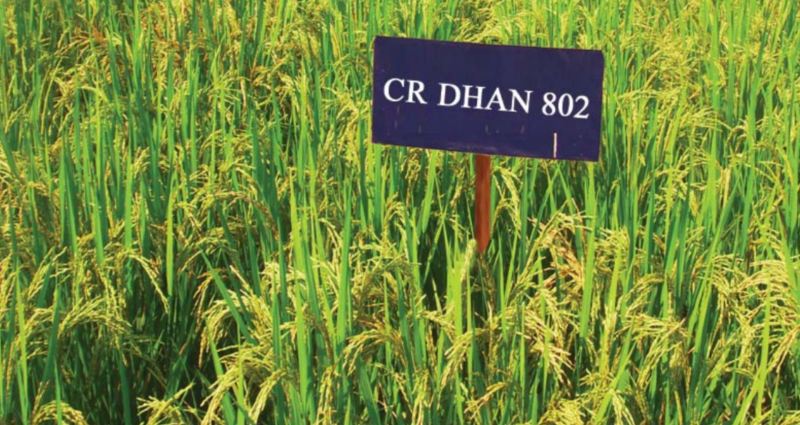Dr. Sharat Kumar Pradhan, the Assistant Director General (Food & Fodder Crops) at ICAR, New Delhi, has made exceptional strides in agricultural research, particularly in the fields of climate-smart and climate-resilient rice breeding and genetics. With an illustrious 25-year career as a rice breeder at ICAR-NRRI, Cuttack, he has developed 61 rice varieties that address the unique needs of diverse Indian regions. Notably, five of these varieties were crafted through molecular breeding techniques. Dr. Pradhan’s contributions have touched over 60 lakh hectares of land, with an estimated breeder seed demand of approximately 300 quintals across 20 states.
As a distinguished academician, Dr. Pradhan has authored over 150 research papers and contributed to six books and 34 book chapters. His groundbreaking work in gene/QTL stacking for climate resilience and the identification of stress tolerance traits in rice has led to the discovery of 60 novel QTLs/genes, pushing the boundaries of scientific knowledge in his field.
Dr. Pradhan’s achievements have earned him recognition as a Fellow of prestigious institutions such as NAAS, ISGBP, and ARRW. He has received numerous awards, including the Dr. LK Sikka Award and the NRRI Best Scientist Award, three times. His commitment to fostering future talent is evident in his mentorship of 11 Ph.D. and 15 MSc students. Furthermore, as the former Editor-in-Chief of Oryza, Dr. Pradhan has played a pivotal role in shaping rice research in India.
In an exclusive conversation with The Interview World, Dr. Pradhan provides an in-depth overview of the climate-smart seeds he has developed over the years. He further details the strategies essential for accelerating the breeding of multi-trait, climate-smart varieties, explains how these seeds are being adopted by farmers, and offers valuable insights into the ongoing R&D initiatives at ICAR. Here are the key highlights from his compelling conversation.
Q: Could you elaborate on the climate-smart seeds you’ve developed over the years, and share the most notable ones in terms of their impact and innovation?
A: Climate-smart and climate-resilient – these terms have become increasingly prevalent in discussions today. And for good reason. They are no longer just buzzwords but necessities. Allow me to explain why.
Climate change is impacting us in ways we can no longer ignore, particularly in agriculture, which bears the brunt of these changes. Calamities like droughts and floods, which were once rare, are now occurring more frequently and with greater intensity. The frequency and scale of these events are escalating, causing profound disruptions. These are the adverse effects we are grappling with.
To address this, we must devise strategies to adapt to these challenges. In the past, our approach focused on developing resilient crop varieties that could withstand specific stressors, such as high or low temperatures, flooding, and strong winds. However, achieving stress tolerance in crops through traditional breeding methods is a time-consuming process.
For example, transferring a single resistance gene into a superior variety takes about six to seven years through classical breeding techniques. The process of making that variety available to farmers can take up to ten years. With the growing need for multiple stress-tolerant traits—such as resistance to floods, droughts, and pests—this timeline becomes untenable.
If we were to breed different varieties for each trait, farmers would see no immediate benefit. Adding just one trait requires years of work, and breeding for multiple traits—10, 12, or even 15—could take over a century. This approach is simply not viable if we aim to address the urgent needs of today’s agricultural landscape.
Q: What strategies or solutions do you believe are key to accelerating the breeding of multi-trait, climate-smart seeds?
A: We are now pursuing a groundbreaking approach to integrate all these necessary traits into one superior variety. Our goal is to develop a climate-smart version of the crop, combining multiple resilient traits into a single, high-performing background. However, this is no easy task. It requires precision, coordination, and, most importantly, time.
Traditionally, adding just one or two traits has taken six to seven years. But with the aid of biotechnology—specifically, marker-assisted selection and other advanced techniques—we can reduce this timeline to just two or three years. This accelerated process allows us to simultaneously incorporate multiple traits, which is where genomic-assisted breeding comes in. This approach enables us to combine various desirable traits in one variety at the same time.
By leveraging genomic-assisted breeding coupled with speed breeding, we can significantly shorten the breeding cycle. In just five to six years, we can develop a variety with all the desired traits in a superior, high-yielding background. Speed breeding accelerates the process, while genomic-assisted breeding ensures that all the traits are transferred efficiently. This combined strategy is an advanced form of plant biotechnology that holds immense potential.
Our work is focused on applying genomic-assisted breeding across all major crops in the country. We have made some progress with wheat and rice, and similar advancements are being made in maize in other countries. We are confident that, by implementing this innovative approach, we will be able to develop highly resilient, multi-trait-tolerant varieties. This is the direction we are taking, and it is poised to transform agriculture in India.
Q: Are these climate-smart varieties being actively used by Indian farmers, or are they still in the research and development phase?
A: In our efforts to create climate-smart rice varieties, we have made significant strides by integrating key traits like drought and submergence tolerance, along with resistance to major diseases. Recently, the Prime Minister launched two climate-smart rice varieties, but before that, we had already developed two groundbreaking varieties.
One such variety is CR Dhan 801, which combines drought and submergence tolerance into a single, high-yielding Sona variety—one of the most popular in the region. We achieved this without compromising its yield or quality. In a similar vein, we introduced CR Dhan 802, named after the legendary freedom fighter Subhas Chandra Bose. This variety, which is essentially an enhanced version of Sona, incorporates both drought and submergence tolerance while maintaining the original characteristics of the Sona variety.
Our goal is to continually enhance these varieties by adding even more beneficial traits, making them increasingly resilient and “smarter.” This is the direction we are taking to develop climate-smart rice varieties that not only withstand adverse conditions but also deliver high-quality yields.
Q: What ongoing R&D activities at ICAR are focused on developing more climate-smart seed varieties?
A: We are now focusing on breeding multi-trait varieties across nearly all crops, aiming for enhanced backgrounds with high yields and robust resistance to diseases and pests. This approach, driven by genomic-assisted breeding, holds immense potential. We are confident that the future looks promising. By harnessing this technology effectively, we will ensure that both farmers and society reap significant benefits.









